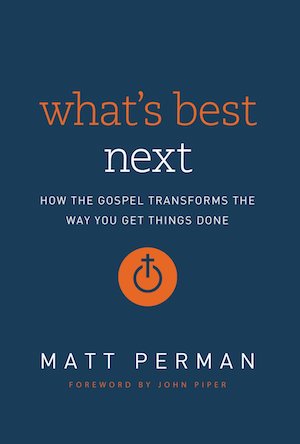 What’s Best Next is the kind of book I should have read years ago. It is effectively a Christian distillation of recent wisdom on productivity, time-management, and personal leadership, drawing heavily on the work of people such as Stephen Covey (First Things First), David Allen (Getting Things Done), and Peter Drucker (The Effective Executive). (I’ve been reading the original edition from 2014, not the expanded edition from 2016.)
What’s Best Next is the kind of book I should have read years ago. It is effectively a Christian distillation of recent wisdom on productivity, time-management, and personal leadership, drawing heavily on the work of people such as Stephen Covey (First Things First), David Allen (Getting Things Done), and Peter Drucker (The Effective Executive). (I’ve been reading the original edition from 2014, not the expanded edition from 2016.)
Many of us find ourselves engaged in what Peter Drucker describes as ‘knowledge work’, as opposed to manual labour. Our lives are characterised by ambiguity and by overload. It’s not clear what we should be doing next, and there are zillions of things clamouring for our attention. It is in this context that skills in productivity are so important.
Matt Perman honed his skills in leadership and productivity during 13 years at Desiring God Ministries, where he ended up as director of strategy. As such, it is no surprise that John Piper is the major theological influence behind the book. This is reflected in Perman’s explanation of how the gospel transforms the way we get things done. For example, ‘Don’t just try to get things done; seek to serve others to the glory of God in everything you do. More than that, be proactive and enthusiastic in doing good for others’ (p. 80). Our works are a response to the unmerited grace of God shown to us in Jesus Christ. As such, they are not an attempt to earn God’s favour. But our works are still valuable, because they are a means by which we can serve others, to the glory of God.
I still have a lingering feeling that the gospel ought to transform our attitude to productivity at an even more fundamental level. We live in a world that is obsessed with maximising productivity. Perman provides a Christian motivation for that obsession (the grace of God), and a Christian objective to pursue with that obsession (the good of others for the glory of God), but stops short of questioning the obsession itself. I think this is a shame. It does seem to be worth at least asking the question (as I did in a recent post): Does God want you to maximise your productivity?
Having said that, most of the book isn’t really about maximising things. It is more about making sure the things we do are the right things to be doing. ‘More important than efficiency is effectiveness—getting the right things done. Efficiency doesn’t matter if you are doing the wrong things in the first place’ (p. 13). This is reflected in what Perman describes as ‘the core principle of productivity’: ‘Know what’s most important and put it first’ (p. 133). (Hence, What’s Best Next.) This is actually two core principles: ‘know what’s most important’ (personal leadership), and ‘put it first’ (personal management) (p. 137). This is unpacked using the acronym DARE: Define, Architect, Reduce, Execute.
Define is about knowing what’s most important. The most helpful part of this, for me, was the section on roles. We each have multiple callings, or roles, in our lives. Each of these translates into important things that we should be doing with our time. It is essential to keep all of these roles in focus, because it is far too easy for certain roles to be neglected. Most obviously, if your work life makes limitless ‘urgent’ demands on your time, there is a serious risk that your other roles will be neglected, such as your callings as a family member, a friend, or a church member.
With those various callings in mind, the next step is to Architect your time, by means of a flexible structure for a typical week. This involves ‘creating a basic structure for your life by identifying the most important activities from your roles and then slotting them in to create a flexible framework for your week so that it is natural to do them’ (p. 193).
The next step is to Reduce, using the acronym DEAD: Delegation (giving responsibility to others, enabling them to use their gifts), Elimination (some things don’t need to be done!), Automation, and Deferring (ideally to a specific date).
With all of that in place, the final step is to Execute. The most important part of this is the weekly workflow, which involves looking through your roles, and your current projects and actions, and identifying your priorities for this week. On a day-to-day basis, Perman recommends starting the day by executing a daily workflow (most days, at least), which includes planning the day, and getting up-to-date with emails and the like, in order to make space for creative thinking during the rest of the day. This kind of planning is the ‘core tactic’ of the book:
Core tactic: Plan your week, every week! Then, as things come up throughout the day, ask, ‘Is this what’s best next?’ Then, either do them right away or, if you can’t, slot them into your calendar or actions list so that you will be sure to do them at the right time (p. 330).
There is much more in the book. But these four elements are the primary ones I will be taking away from the book: identifying my roles, creating a framework for the week, the weekly workflow, and the daily workflow. Ask me in a few months how it has worked out…